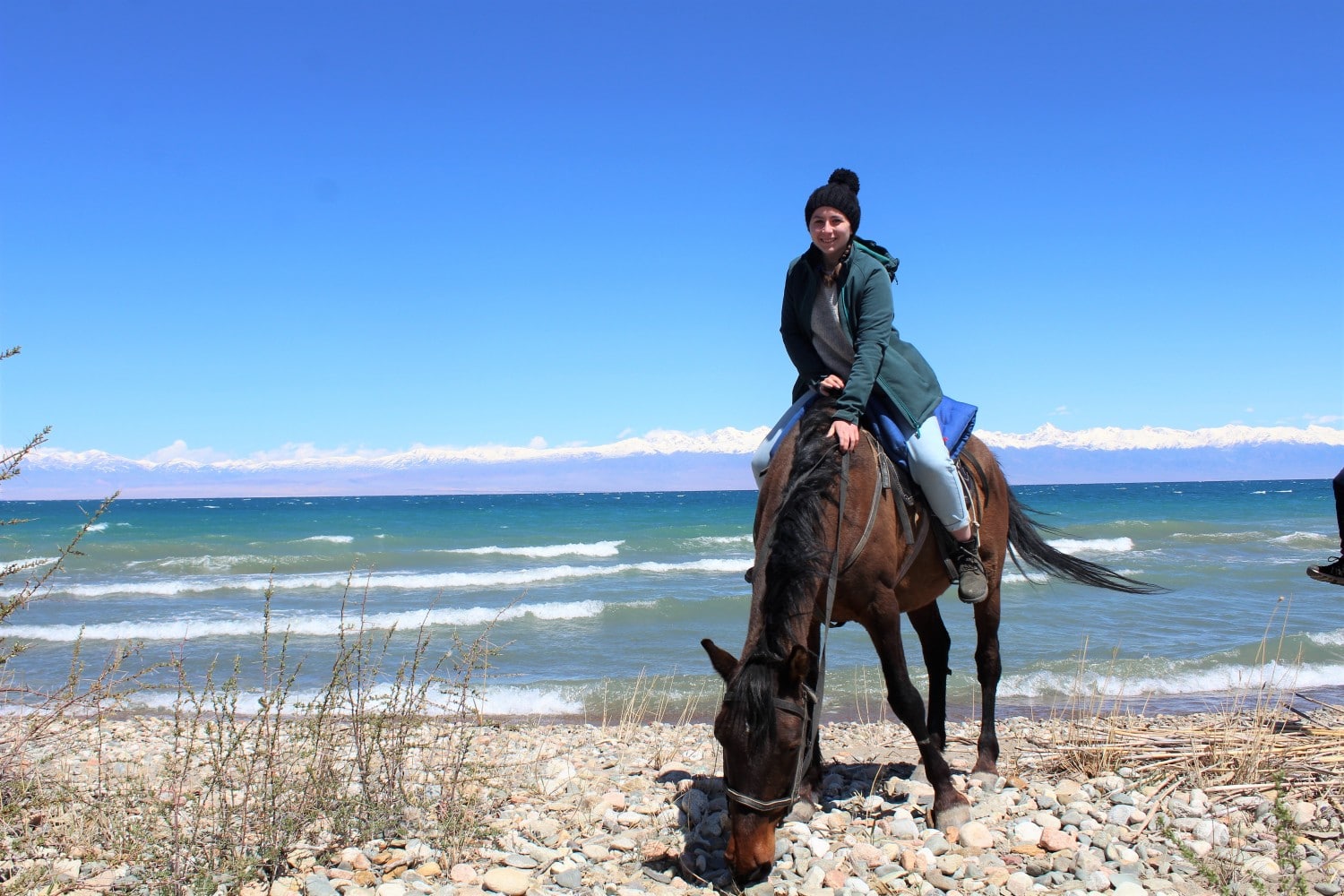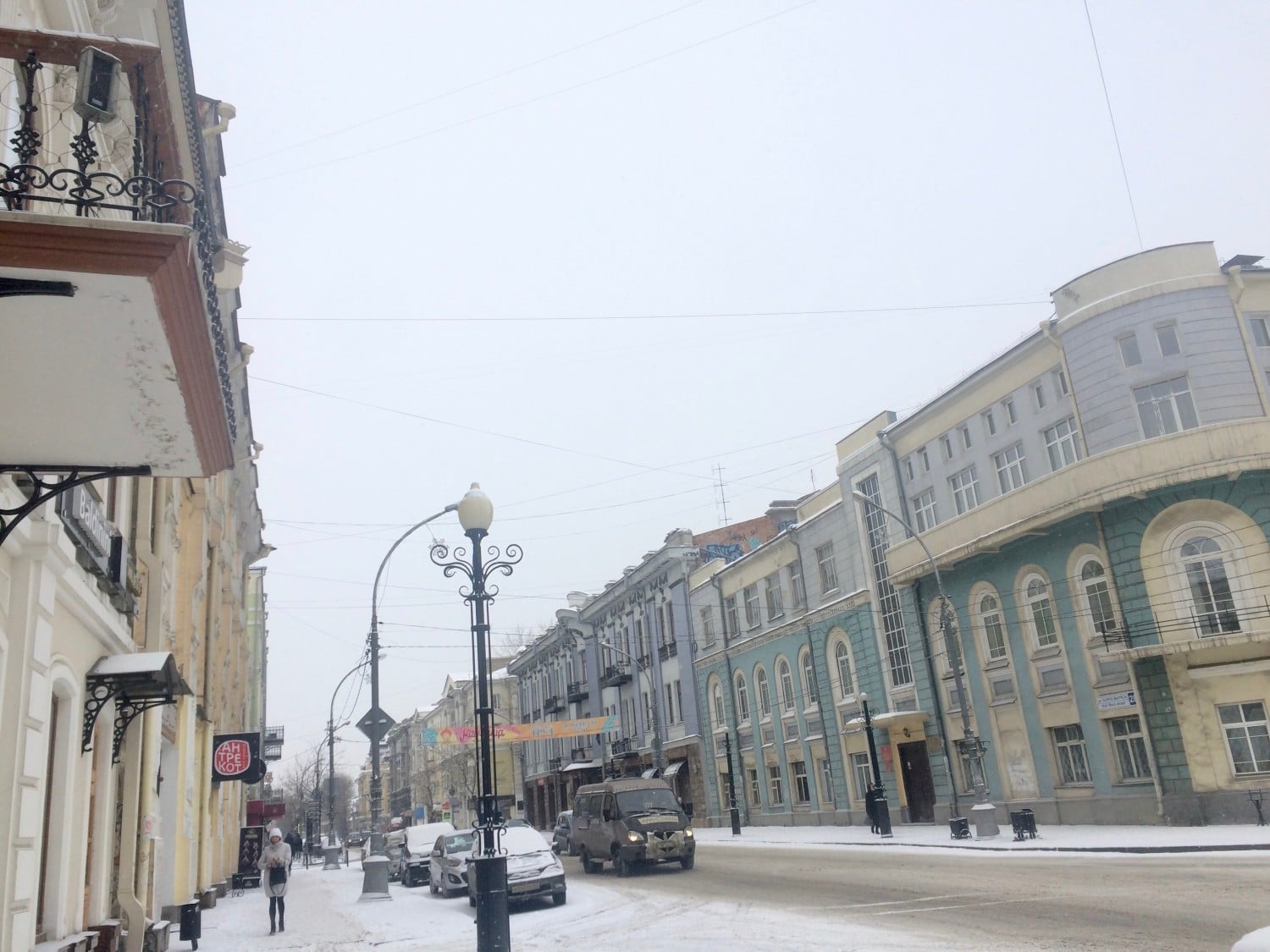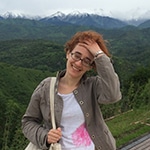Julie studied abroad in Bishkek and Irkutsk, learning Russian as a Second Language with SRAS’s Home and Abroad Scholarship program, with the goal of someday having some sort of Russia/Eurasia-related career. Below is her review of her programs abroad and experience as a Home and Abroad Scholar.
Academic Program in Bishkek and Irkutsk
Bishkek
First, the basics. I was in the Russian as a Second Language program. I had class four days a week, 8:30 to 2:30, all Russian-language. My day off, Wednesday, was devoted to grammar workshops (optional), cultural programming, and peer tutoring (about an hour of talking to a university-age student in Russian). The classes—grammar, reading, and conversation—were all one-on-one, me and a teacher. The sheer volume of classes and the generally high quality of teaching worked out well for me. My Russian got a million times better, and that’s pretty much all I was asking for. The London School isn’t a perfect place, but academically I was basically satisfied.
The downsides: I found this schedule inflexible, especially after a few months, when my teacher seemed to run out of grammar to teach me and had no idea what to do with me; that time would have been devoted better to listening and conversation, the things I was bad at, but the school didn’t really respond when I suggested this. I also discovered, after I left, that there were some more advanced special-topic Russian classes I didn’t know about, and would have wanted to take (including a class on political language)—so if you go to Bishkek, look into this if its something you might be interested in.
Irkutsk
One major caveat: My situation in Irkutsk was very unusual, and while I’ll be honest here, those of you reading should probably not take this as indicative of how your experience would be in Irkutsk. The university in Irkutsk that usually runs SRAS programs (EALI) had just merged with another university (ISU), and this created… some problems. (Including the fact that I was supposed to go to Irkutsk in September, but the international office, affected by all the changes and staff shifts, forgot to submit my visa application). I expected the situation at the university to be disorganized when I got there—and it was. The library still isn’t fully set up; the professors are still adjusting to the extensive bureaucratic changes; it was difficult to find people who could give me advice about what classes to take, and even the person who was ostensibly in charge of this just didn’t always have full information. None of this was really anyone’s fault, but that didn’t make it any less frustrating.
So, on to the actual classes. I had a pretty high level of Russian by the time I got to Irkutsk (mostly due to my time in Bishkek), so instead of having 180 hours of group classes with international students, I was supposed to take classes with the regular Russian students in the philology department, plus some classes with the international students in a master’s degree program for International Communication (Russian language, basically). This was outside SRAS’ usual Russian as a Second Language program there, and was to be, essentially, a completely customized program.
This sounded great in theory, but because of the above-mentioned problems I had a lot of trouble creating a class schedule that suited me—some classes were unexpectedly canceled; I often showed up for classes that didn’t exist; and it was hard to get good advice about what classes might suit me (or maybe there just weren’t any). The classes with Russian students were almost impossible to follow, and I felt completely out of place in them; and the classes with the international master’s students were too easy.
For anyone following a similar path in Irkutsk (which, again, would not be the majority of SRAS students), I’d recommend spending a lot of time making sure you’re satisfied with your schedule—the university admins were theoretically willing to help me, but I just got so tired and frustrated that I ultimately settled with a less-than-stellar set of classes when my first several attempts to fix the situation didn’t yield good results. Basically, don’t be afraid to ask the university and SRAS for help with this one, and be determined to advocate for yourself; otherwise you’ll end up in the situation I did, because no one is going to help you unless you push for it.
I also had 120 hours of one-on-one instruction, which went very well: my teacher and I spent most of our class time just talking, often arguing about politics, which was fantastic practice. It was also a confidence booster to feel like I could actually carry on a normal conversation on normal topics.
Overall, I enrolled in this program right after finishing a master’s degree because my Russian wasn’t great and I wanted a higher level so I could get a job in which Russian was an important component. My Russian has definitely gotten much better, and my plans haven’t changed; I am trying to find a Russian-related job and feel more or less qualified to do this—I’m not fluent, but I’m at least decent. In that sense, the program did meet my needs, though there will always be room for my Russian to continue to improve.
Cultural Program and SRAS Support
I chose SRAS because I knew from past experience that studying in the former Soviet Union is stressful and difficult, and I thought it would be useful to have the backup of an organization in the US to help with problems I might run into. While that was the case sometimes, and it was comforting to know that I could appeal to English-speaking people in case of emergency, it’s also important to know that SRAS is not magical. Studying abroad is really hard, and no matter what, you will run into problems and frustrations. SRAS was helpful with some of the issues I had with my classes in both Bishkek and Irkutsk; but there was little they could do about the massive problems I had with getting my visa, due to the massive problems that came with the shifts in bureaucracy as the universities merged in Irkutsk.
The American arm of SRAS was not involved in most of the day-to-day problems I had here; once you’re abroad, the international department and the on-site coordinator will mostly be responsible for helping you with these things in Bishkek and Irkutsk. I didn’t realize this in advance, though it wasn’t really a problem. And SRAS (in the US) was immediately responsive when I let them know that I was having problems with my schedule, which I appreciated—their intervention seemed to be a good motivating factor for the people here to help me out.
The cultural program is a good benefit to studying with SRAS; you’ll get to go, for free, to many of the major attractions you’d want to go to anyway, and some of them are places it might be a bit difficult to get to on your own. The overnight trip to Bolshoe Goloustnoe was an absolute highlight, and something I definitely wouldn’t have done on my own.
Home and Abroad Internship
I had a Home and Abroad internship for the full academic year. I was on the Humanities track, and my internship involved SRAS’s new site, PopKult.org. As the main writer for the site, I wrote more than 350 posts about music, movies, and TV in Russia, Eurasia, and Eastern Europe. The internship was about 10 to 12 hours per week all year, with a Christmas break. I also wrote some posts on things to do in Irkutsk for this site my second semester.
I’m really glad I did this internship (and not just for the scholarship money). I learned a ton about popular culture in Eurasia, including the ways popular culture interacts with daily life, and sometimes with politics. As a literature-major-turned-social-scientist, this was a perfect intersection for me, and is something I want to keep in mind in my future plans. I also felt like the internship was a fantastic excuse (or force) to make me keep thinking about, and in, Russian in my non-class time. Because I did the vast majority of my research for the site in Russian, my reading skills picked up really fast, and I can now read most Russian media easily. Without the internship, I probably would have been tempted to rely on my usual American-language sites in my spare time; this way, I spent a lot of additional time thinking and learning about Russia and improving my Russian.
Of course, the internship is a lot of work. There were definitely weeks when it was a struggle to go to class, come home, and do a ton of work in Russian; it was sometimes exhausting. But ultimately I’m proud of the work I did for the site and thrilled with the language and cultural knowledge I acquired along the way.
Takeaways and Advice
I was told many, many times—by SRAS, other study abroad organizers, and everyone in between—that studying in Russia/Eurasia can be frustrating, that things often don’t go according to plan, and that life will occasionally be difficult. I didn’t quite take this message to heart, for whatever reason, and still, at the end of my program, am often frustrated when plans change, things are unexpectedly canceled at the last minute, and things just don’t run smoothly in general. I think if I had been able to chill out more about this and understand that nothing would be smooth, things would have gone easier for me here. But I’m sure I got something out of this constant adjusting to frustrations and missed expectations (though I’m not sure what yet!).
My major point of advice is that, as I mentioned above, if you have problems with anything, tell someone about it—SRAS or the people at the university who work with international students. This sounds stupid obvious, but maybe this advice will come in handy for someone else: If you’re unsatisfied with your classes, tell someone. If you don’t know what’s going on with your multiple-entry visa, definitely tell someone. You might have to keep bugging people more than you’re used to, but it’ll be worth it. Of course, you do have to be responsible for yourself, but you also don’t have to live with things that someone else might be able to fix without too much trouble.
Living Abroad
I feel like a lot of this post has been negative, but that’s such a small part of the story. Now that I’m close to leaving Russia, none of those frustrations or irritations matter at all. Living abroad is the best thing I’ve ever done in my entire life, and (after my three years abroad, this last one with SRAS) I can’t really absorb the fact that I’ll be living in America again soon. Yes, I’ve complained about a lot of things, but the experiences I’ve had made up for all that, and more: traveling around Kyrgyzstan and Russia, learning about the national cuisines, having a variety of confusing and unintelligible and sometimes successful conversations in Russian, and just conducting my daily life in Russian—having a favorite brand of Kyrgyz cookies and frozen pelmeni, eating as many blini as humanly possible, and, of course, when necessary, sitting around in my apartment all day watching Russian TV and staring out my window at the beautiful Orthodox church just down the street.
Basically, my advice is just go live abroad – even if you have to ignore everything else I’ve written here.
More on Programs in Irkutsk and Bishkek
Posts not found

Bishkek Study Abroad Reviews
We asked some SRAS graduates to share their open and honest evaluations of their experiences on SRAS Study Abroad in Bishkek. SRAS actively seeks out feedback from students on all programs so that we can continually improve our offerings. Kathryn Watt (Spring, 2019) For the last four months I have lived and studied in Bishkek, […]


